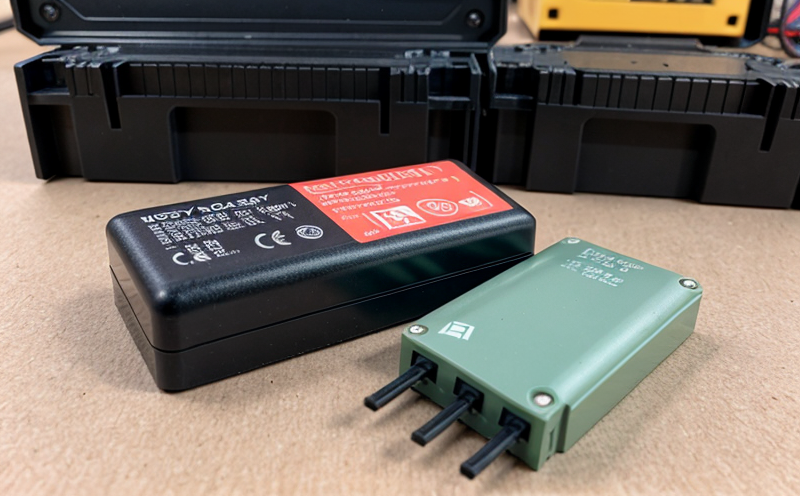IEC 63018 Battery Pack Testing for Portable Electronics
The IEC 63018 standard is a cornerstone in the field of portable electronics battery testing, designed specifically to ensure the safety and reliability of lithium-ion batteries used in consumer devices. This international standard provides comprehensive guidelines that address various aspects of battery pack design, manufacturing, and performance evaluation.
Manufacturers of portable electronic devices such as smartphones, laptops, tablets, and wearables must adhere to IEC 63018 to ensure their products meet stringent safety requirements. The standard covers a wide range of tests including electrical safety assessments, thermal stability checks, mechanical durability evaluations, and more.
The testing process under IEC 63018 involves meticulous preparation of the battery packs according to specified protocols. This includes ensuring that all components are correctly assembled and that the battery meets specific dimensional tolerances. Once prepared, the packs undergo rigorous electrical safety tests which involve checking insulation resistance, overcurrent protection, and ground continuity.
Thermal stability checks are also critical as they assess how well the batteries can withstand extreme temperatures without degrading or catching fire. Mechanical durability evaluations test the resilience of the battery against impacts and vibrations to ensure it remains functional even under rough conditions.
The results from these tests form part of an extensive report that outlines whether each batch of batteries complies with IEC 63018 standards. This comprehensive documentation is essential for manufacturers as it provides evidence of adherence to international safety regulations, thereby enhancing consumer trust and product reputation.
| Test Type | Description | Objective |
|---|---|---|
| Electrical Safety Tests | Includes checking insulation resistance, overcurrent protection, and ground continuity. | To ensure safe operation of the battery pack under normal conditions. |
| Thermal Stability Checks | Evaluates how well the batteries can withstand extreme temperatures without degrading or catching fire. | To prevent potential hazards associated with overheating and thermal runaway. |
| Mechanical Durability Evaluations | Tests resilience of the battery against impacts and vibrations. | To ensure continued functionality even under harsh environmental conditions. |
In summary, compliance with IEC 63018 is not just a regulatory requirement but also an assurance that your product will perform reliably over its intended lifespan. By adhering to this standard, you can build a strong foundation for trustworthiness and safety in the market.
- Ensures safe operation of battery packs under normal conditions.
- Avoids potential hazards associated with overheating and thermal runaway.
- Guarantees continued functionality even under harsh environmental conditions.
Industry Applications
The application of IEC 63018 extends beyond just ensuring safety; it plays a crucial role in enhancing the overall performance and longevity of portable electronic devices. Here are some key areas where this standard finds its utility:
- Consumer Electronics: Ensures that batteries used in smartphones, tablets, and other consumer electronics meet rigorous safety standards.
- Medical Devices: Provides assurance that medical equipment powered by lithium-ion batteries operates safely and reliably.
- Telecommunications: Supports the development of portable communication devices like mobile phones and satellite phones.
- Transportation Electronics: Facilitates the design and testing of electronic systems used in vehicles, including those for navigation, entertainment, and safety features.
The standard's broad applicability makes it an indispensable tool across various sectors, ensuring that all devices powered by lithium-ion batteries are safe and reliable.
Quality and Reliability Assurance
The quality and reliability of portable electronic device batteries are paramount for maintaining user satisfaction and operational efficiency. Compliance with IEC 63018 ensures that these batteries meet the highest standards, providing a robust framework for quality assurance.
- Insulation Resistance: Ensures there is no electrical leakage which could lead to safety issues or damage to other components.
- Overcurrent Protection: Prevents excessive current flow that can cause overheating and potential hazards.
- Ground Continuity: Maintains a stable connection between the battery and ground, ensuring safe operation.
The stringent testing procedures outlined in IEC 63018 help manufacturers identify any weaknesses or defects early on, allowing for timely corrective actions. This proactive approach contributes significantly to enhancing both product quality and reliability.
By adhering to these standards, companies can demonstrate their commitment to excellence, fostering trust among consumers and stakeholders alike.
Use Cases and Application Examples
- Smartphones: Ensuring that batteries last longer while maintaining high performance levels.
- Laptops: Providing reliable power for extended periods without compromising on battery life.
- Tablets: Enhancing durability to withstand frequent use and accidental drops.
- Wearables: Guaranteeing consistent operation regardless of the environment or physical conditions.
The real-world impact of IEC 63018 is evident in everyday products that people rely on. From powering our daily communications to supporting critical medical devices, this standard ensures that lithium-ion batteries perform consistently and safely across diverse applications.





